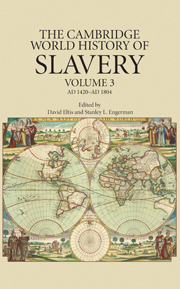Book contents
- Frontmatter
- Contents
- List of Maps, Figures, and Tables
- Contributors
- Series Editors' Introduction
- 1 Dependence, Servility, and Coerced Labor in Time and Space
- PART I SLAVERY IN AFRICA AND ASIA MINOR
- PART II SLAVERY IN ASIA
- PART III SLAVERY AMONG THE INDIGENOUS AMERICANS
- PART IV SLAVERY AND SERFDOM IN EASTERN EUROPE
- PART V SLAVERY IN THE AMERICAS
- PART VI CULTURAL AND DEMOGRAPHIC PATTERNS IN THE AMERICAS
- PART VII LEGAL STRUCTURES, ECONOMICS, AND THE MOVEMENT OF COERCED PEOPLES IN THE ATLANTIC WORLD
- 22 Involuntary Migration in the Early Modern World, 1500–1800
- 23 Slavery, Freedom, and the Law in the Atlantic World, 1420–1807
- 24 European Forced Labor in the Early Modern Era
- 25 Transatlantic Slavery and Economic Development in the Atlantic World: West Africa, 1450–1850
- PART VIII SLAVERY AND RESISTANCE
- Index
- References
25 - Transatlantic Slavery and Economic Development in the Atlantic World: West Africa, 1450–1850
from PART VII - LEGAL STRUCTURES, ECONOMICS, AND THE MOVEMENT OF COERCED PEOPLES IN THE ATLANTIC WORLD
Published online by Cambridge University Press: 28 September 2011
- Frontmatter
- Contents
- List of Maps, Figures, and Tables
- Contributors
- Series Editors' Introduction
- 1 Dependence, Servility, and Coerced Labor in Time and Space
- PART I SLAVERY IN AFRICA AND ASIA MINOR
- PART II SLAVERY IN ASIA
- PART III SLAVERY AMONG THE INDIGENOUS AMERICANS
- PART IV SLAVERY AND SERFDOM IN EASTERN EUROPE
- PART V SLAVERY IN THE AMERICAS
- PART VI CULTURAL AND DEMOGRAPHIC PATTERNS IN THE AMERICAS
- PART VII LEGAL STRUCTURES, ECONOMICS, AND THE MOVEMENT OF COERCED PEOPLES IN THE ATLANTIC WORLD
- 22 Involuntary Migration in the Early Modern World, 1500–1800
- 23 Slavery, Freedom, and the Law in the Atlantic World, 1420–1807
- 24 European Forced Labor in the Early Modern Era
- 25 Transatlantic Slavery and Economic Development in the Atlantic World: West Africa, 1450–1850
- PART VIII SLAVERY AND RESISTANCE
- Index
- References
Summary
The development of markets and the market economy was central to the process of socioeconomic development in the Atlantic world from the fifteenth to the nineteenth century. In the main, the process was propelled by the plantation and mining zones located in the New World. Large-scale specialization in commodity production for Atlantic commerce in these zones created markets, which stimulated a second round of large-scale specialization in the production of goods and services for Atlantic commerce in other regions across the Atlantic. The third round in the causal linkages that produced generalized market development and the geographical spread of the market economy in the Atlantic world occurred within the domestic economies in the region. Wherever specialization in the production of goods and services for export to Atlantic markets occurred, a domestic market was created for producers within the domestic economy, as long as all or the bulk of the specialized export producers' needs were not imported from elsewhere. The process in respect of colonial North America has been described by Shepherd and Walton:
While overseas trade and market activity may not have comprised the major portion of all colonial economic activity, the importance of the market was that of improving resource allocation.…We argue that while subsistence agriculture provided an important base to colonial incomes and was a substantial part of average per capita income, changes in incomes and improvements in welfare came largely through overseas trade and other market activities. Not only did improvements in productivity occur primarily through market activity, but the pattern of settlement and production was determined by market forces. […]
- Type
- Chapter
- Information
- The Cambridge World History of Slavery , pp. 650 - 674Publisher: Cambridge University PressPrint publication year: 2011

